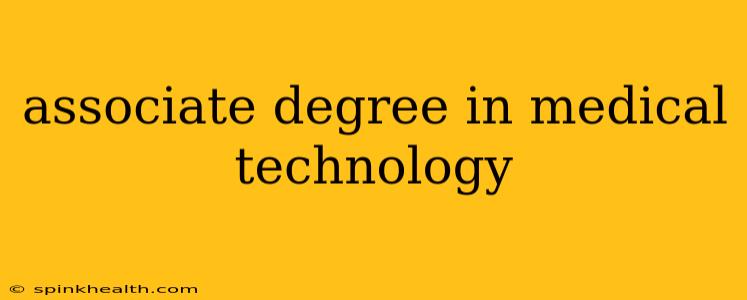The hum of the centrifuge, the precise pipetting, the thrill of unraveling a medical mystery – this is the world of medical technology. An associate degree in medical technology offers a fast-track into this exciting and vital field, providing a solid foundation for a rewarding career in healthcare. But what exactly is involved? What career opportunities await? And is it the right path for you? Let's delve into the details.
What Does an Associate Degree in Medical Technology Entail?
Imagine a career where you're on the front lines of patient care, contributing to accurate diagnoses and effective treatments. That's the promise of a medical technology career. An associate degree program typically takes two years to complete and provides a comprehensive education in laboratory procedures, medical terminology, and analytical techniques. You'll learn to operate sophisticated equipment, analyze specimens, and interpret results, all while adhering to strict quality control and safety standards. Think of it as becoming a detective, meticulously piecing together clues from blood samples, tissue cultures, and other biological materials to help healthcare professionals reach crucial conclusions.
What are the Career Opportunities After Completing an Associate Degree in Medical Technology?
This isn't just about lab work; it's about contributing directly to patient well-being. Graduates with an associate degree in medical technology can pursue a variety of roles, including:
- Medical Laboratory Technician: This is a common entry-level position, involving performing routine laboratory tests, maintaining equipment, and ensuring accurate record-keeping. It's a hands-on role demanding precision and attention to detail.
- Clinical Laboratory Technician: Similar to a medical laboratory technician, but often with a focus on a specific area of testing, like hematology (blood) or microbiology (infections).
- Phlebotomist: While not strictly a medical technology role, many programs provide foundational training in phlebotomy – the process of drawing blood samples – a crucial skill in any medical laboratory setting.
- Histology Technician: Specializing in the preparation and examination of tissue samples for microscopic analysis, crucial for cancer diagnosis and other medical investigations.
- Cytology Technician: Focusing on the study of cells, particularly in the detection of cancerous cells in Pap smears and other specimens.
What are the Job Prospects for Medical Technologists?
The healthcare industry is constantly evolving, and the demand for skilled medical technologists remains strong. The job outlook is generally positive, with opportunities for advancement and specialization as you gain experience. The need for accurate and timely laboratory results is paramount in modern medicine, making medical technologists indispensable members of any healthcare team.
How Much Does a Medical Technologist Earn?
Salaries vary depending on location, experience, and specialization. However, entry-level positions typically offer competitive starting salaries, with opportunities for increases as you gain expertise and certifications.
What are the Necessary Skills for Medical Technologists?
Beyond the technical skills acquired through your education, certain soft skills are essential for success in this field. These include:
- Attention to Detail: Accuracy is paramount. One small mistake can have significant consequences.
- Problem-Solving Skills: Analyzing test results and identifying potential issues requires analytical thinking and problem-solving abilities.
- Communication Skills: Effectively communicating test results to healthcare professionals is crucial.
- Teamwork Skills: Medical technologists work as part of a larger healthcare team, requiring collaboration and effective communication.
Is an Associate Degree in Medical Technology Right for Me?
If you're detail-oriented, scientifically inclined, and passionate about contributing to patient care, then an associate degree in medical technology could be the perfect path for you. It's a fast-track to a rewarding and vital career in a constantly evolving field. The combination of intellectual stimulation, hands-on work, and the knowledge that you're making a real difference in people's lives makes it a truly fulfilling career choice. Do your research, explore different program options, and consider shadowing a medical technologist to get a firsthand feel for the day-to-day realities of the profession. The rewards await those who are dedicated and passionate about this crucial role in healthcare.

